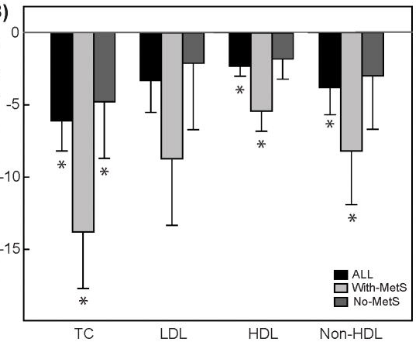Have you ever checked your lipoprotein a? You might not have heard about it before, but we can consider it a very important market for our overall health. It is considered to be the single most important genetic predictor for heart disease.
Today, I want to dive into what it is, what it means, and what it can mean for your long-term health.

Why Does Lipoprotein a Matter?
Conversations surrounding heart disease are often based on genetic connections. This means that if your family members and relatives have heart disease, then you are more likely to have it yourself. But, how do you know if you are at risk?
What we need to find are genetic links that can help us learn more about our bodies. As well as what our bodies are trying to tell us when it comes to our risk for disease. The fact of the matter is that your lipoprotein a levels might just be the key.
As it turns out, your lipoprotein-a might just be the strongest genetic link that we have. Even more than cholesterol, which determines whether or not you are at risk for heart disease. This even applies to strokes, and not just heart attacks.
Bottom Line: Here’s the key, if your lipoprotein a level is higher you have inherited a risk of heart disease from your family members. If it is lower, you have not. Now, let’s discover a bit more about it, before diving into what we can do to help curb our future risks.
What Is Lipoprotein a?
Quite simply, lipoprotein a is a molecule that carries cholesterol, fats, and proteins through the bloodstream. It has some similarities to LDL cholesterol, in that it has apolipoprotein b, but it is different in that it also has apolipoprotein (a).
How Do You Test For It?
Any blood test, and anywhere that you might get blood tests done, can do a test for lipoprotein a. That being said, we cannot expect it as part of a routine screening.
This means that, unless you ask for it specifically, you are unlikely to see your lipoprotein a levels in a general health screening.
At the same time, just because it is not included in traditional screening packages does not mean that you cannot ask for it. It is fairly easy to provide.
What Is Considered Normal, High, and Very High?
If you have been recently tested for lipoprotein a, and quickly want to make sense of your results. Here is what you should know:
- Normal is under 30 mg/dL (75 nmol/L)
- High risk 31-50 mg/dL (75-125 nmol/L)
- Very high risk 50+ mg/dL (>125 nmol/L)
Bottom Line: Your lipoprotein a level has nothing to do with your lifestyle. This means that no matter your diet, or how much exercise you are getting, your lipoprotein a levels are where they are – and that’s about it!
Who Is Affected?
Many people are affected by their lipoprotein a levels. The fact is that these levels are a strong determinant of the risks you have inherited for heart disease.
The conversation around lipoprotein a has recently been brought up in the work of Bob Harper. Let me tell you a bit more about him…

Bob Harper
Bob is a celebrity trainer on the television show the Biggest Loser. I had first seen him making an appearance on Rachel Ray, discussing the benefits of the paleo diet (Read: Is the paleo diet really paleo) and butter coffee (Read: Saturated fats and heart disease) and how he had recently converted to it.
The truly sad part of this story is that, mere months after seeing him on television, he had a near-fatal heart attack. The fact that he had survived was due to a very lucky collection of circumstances. But, the type of heart attack that had befallen him is fatal in most circumstances.
Since then, Bob has argued that his lipoprotein-a was one of the big culprits behind his massive heart attack. He even has a new book out discussing that, and how important it is to know more about your lipoproteinia (“The Super Carb Diet”).
Bob is one example of the many who gained a lot more information about their health by simply screening for their lipoprotein-a levels. While he was able to survive his cardiac episode, others are not so lucky. Which is why it is so important to know so that we can cut down our risk factors appropriately.
Who Else?
Who else is out there? These are some of the other folks who might deal with higher (and potentially lower) levels of lipoprotein-a in their system:

- One important thing to know is that the lipoprotein has been known to rise in women who are undergoing menopause.
- About 20% of people can find it elevated when they test for it. I have also talked in greater detail before about the APOE gene. Something important to note is that those with the APOE E2 gene are known to have lower levels of lipoprotein a.1
- African Americans and South Asians have also been shown to have higher levels of lipoprotein a upon testing.
- If parents have a high level of lipoprotein a, about half of the time their children will have it higher as well.
What Can You Do?
So, what do you do when it comes to lipoprotein a? The first thing that I would recommend is to screen for it. If your insurance will not cover it, it should result in an out-of-pocket cost of about $40 – $70.
The thing about it is that your lipoprotein a levels are not something that you need to test for over and over again. This is because it is highly unlikely to change, for better or worse, over time. So, if you screen for it once, you are going to have a pretty clear picture of your levels for quite some time.
Bottom Line: If you are a man or a post-menopausal women, and your levels are normal, you really do not need to test further. Maybe once a decade, but it is unlikely that your levels will shift at all.
On the other hand, if you are a woman who is menopausal or perimenopausal, this might change. Instead, I would suggest testing annually (until you are 5 years removed from menopause).
The reason for this is that your lipoprotein a levels can shift, and can get higher, with menopausal women. So, it helps to have some consistent checking to stay on top of your levels at all times.
Can You Lower Your Lipoprotein-a?
The truth is that there is really nothing that we know of that can lower your lipoprotein-a levels. But, that does not mean that there isn’t anything that we can do about it. Instead, we can focus on lowering the risks. Which is what I want to share with you today…
Before I mention that, one notable exception to this is known as apheresis. This is the process of extracting blood for the purposes of removing lipoprotein-a from your blood. While it might work in the moment, this method is only temporary. Ultimately, it really has no lasting effects.
Instead, let’s consider lipoprotein-a as an amplifier of other cardiovascular risk factors (especially LDL cholesterol). While you cannot change your lipoprotein-a, if you have high levels of it you can keep your LDL cholesterol low (below 70, for example). Then you can mitigate the risks of lipoprotein a significantly.
Some of the other cardiovascular risk factors that we should consider are your:
- Blood pressure (keeping it under 110/70)
- Triglycerides
- Glucose levels
Next, we might want to consider some of the lifestyle factors. These are things like:
- Exercise
- Stress reduction
- Mediterranean diet
Bottom Line: These changes are not going to change your lipoprotein-a scores, I want to make that very clear. Instead, what they will do is reduce your risk factors which will allow your lipoprotein-a scores to carry less weight (and to mean less in terms of your overall health).
Final Considerations
Here are some last-minute considerations about your lipoprotein a levels that I would love for you to learn more about…
Monounsaturated Fats
These may reduce your levels to some extent.2 Studies have shown that they may reduce things by 10 – 20%. There is also research that almonds can have the same effect.3
Menopausal Women
For women who are menopausal, hormone replacement therapy may decrease your levels by 10%.4 More generally, this is probably why we see more heart disease risks for women when they enter menopause (because lipoprotein a levels may elevate).
Extreme Elevation
In cases of extreme elevation, while all of the things I have mentioned above can be useful, here are a couple you might also consider:
- Niacin – This is something of a mixed bag. Niacin may lower your lipoprotein a levels by 30%, but the larger studies looking at the effects of niacin suggest that it does not help the overall risk.5
- Aspirin – In particular as it concerns the risk of stroke, there are times where aspirin therapy can help lower that particular risk.6
- Vitamin C – I have seen some arguments that higher doses of vitamin C may be useful, but they really have not been supported by much in the way of major evidence.
Key Insight: What I really want you to take home from today’s discussion is that even if you alter the markers, you may not be altering the risk in the same way. While you might be able to take steps to artificially lower your lipoprotein a levels, it does not mean that you have dealt with the risk factors at the heart of the issue.
Action Steps: Lipoprotein a Levels
When it comes to dealing with the risk factors associated with elevated lipoprotein a levels, your overarching goal should be to deal with your LDL cholesterol (ideally below 70 units).
How do you go about doing this? While there might be no magic pill or silver bullet on the market, one thing you can consider is resistant starch. (Read: Don’t resist this starch)

The research is truly behind this one. A 26 week-long double-blinded study found that the benefits of resistant starch had a more profound effect on lowering LDL cholesterol than cholesterol-lowering medications (statins).7
That was not the end of it, though. The study also found that those on resistant starch had healthier insulin metabolism, improved glucose metabolism, and they had a better gut microbiome.
I have talked a lot about the benefits of resistant starch, and just how easy it is to find resistant starch in everyday foods. In order to give you a quick primer, here are some of the top food sources that you might even have in your kitchen right now:
- Potatoes do especially when boiled and refrigerated (those with purple flesh are the highest).
- Beans and legumes (especially white beans like navy, northern, and cannellini beans).
- Unripe bananas and the skin from organic ripe bananas.
Bottom Line: Studies like the one above often use amounts of resistant starch which are tough to get in your diet – on your own. There are plenty of good foods that you can include in your diet, but it never comes quite close enough to the amount that they use in these clinical trials.
Your Daily Reset

All things considered, if you are concerned about your LDL levels (and what it means for your lipoprotein a levels and overall risk for heart disease), the Daily Reset Shake (Click Here for Shake) does have the full dose of resistant starch as found in clinical trials.
Other than that, what I can recommend for you is to keep tabs on your LDL cholesterol, watch your other risk factors (like your blood pressure and your blood glucose and blood sugar), and certainly screen for lipoprotein a – at least once!
Test, Don’t Guess!
Now that we have learned a little bit more about our lipoprotein a levels, it always helps to get an even bigger picture of your overall health. Do you know if you are at risk? How about the state of your thyroid?
The Thyroid Quiz (Click Here) can provide you with a quick and helpful window into your health, and what you can do to take it back for yourself. Try it today, and learn a little bit more about how you can start feeling better right away.
Sources
1 – https://www.ncbi.nlm.nih.gov/pubmed/28651346
2 – https://www.ncbi.nlm.nih.gov/pubmed/25506933
3 – https://www.ncbi.nlm.nih.gov/pubmed/12221048
4 – https://www.ncbi.nlm.nih.gov/pubmed/28364865
5 – https://www.ncbi.nlm.nih.gov/pubmed/29449329
6 – https://www.ncbi.nlm.nih.gov/pubmed/28508119
7 – https://www.ncbi.nlm.nih.gov/pmc/articles/PMC4048643/

1. Schedule a Thyroid Second Opinion with me, Dr. C, Click Here for Details
2. Download and use my Favorite Recipes Cookbook Here
3. Check out my podcast Medical Myths, Legends, and Fairytales Here
Dr. Alan Glen Christianson (Dr. C) is a Naturopathic Endocrinologist and the author of The NY Times bestselling Adrenal Reset Diet, The Metabolism Reset Diet and The Thyroid Reset Diet.
Dr. C’s gift for figuring out what really works has helped hundreds of thousands of people reverse thyroid disease, lose weight, diabetes, and regain energy. Learn more about the surprising story that started his quest.


